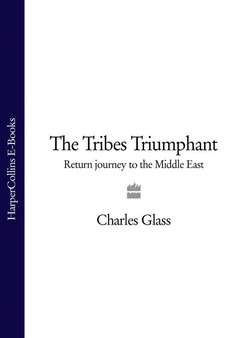Читать книгу The Tribes Triumphant: Return Journey to the Middle East - Charles Glass, Charles Glass - Страница 13
My First Evening
ОглавлениеI turned on the television in my luxury hotel suite. The state channel played Jordanian music videos in homage to King Abdallah. Montages of a young man wailing in Arabic dissolved into the object of his worship, ‘Ya Malik, ya Malik’ – O King, O King. Ten minutes later, while I unpacked and washed for dinner, the news began. The lead story was neither war in Afghanistan nor murder in the West Bank. It was King Abdallah’s courtesy call on a school. This blockbuster, hard to surpass for news value, led on to further exclusives: King Abdallah at a cabinet session, King Abdallah pouring cement on something and, the coup de grâce, the king and his queen, a beautiful Palestinian named Rania, touring another school. I liked the way the producers began and ended their broadcast on the same theme and wondered what other risks they took to keep the populace informed.
I went outside to the new Aqaba. It was a dull, quiet place at Easter 1973, when I’d hitchhiked down from Beirut and slept on the beach. Aqaba had since matured into a mini Miami of gaudy hotels and private beaches. But it was still dull and quiet. The seafront Corniche looped east and south from the Israeli border and boasted scores of modern hotels, restaurants, pharmacies and cafés where young men watched television at outdoor tables. In 1973, Aqaba and I were poorer, making do with simple fare: grilled chicken at open-air rotisseries under dried palm branches on wooden frames. There were only two big hotels. A long stretch of sand separated Aqaba and the border fence, then closed, with Eilat. On this, my first visit in twenty-nine years, the border fence had opened to turn Eilat and Aqaba into one city. Once, Aqaba had been distinctly Arab with overgrown parks, neglected beaches, wedding-cake minarets and a few camels; Eilat was defiantly Euro-Israeli, concrete slabs, grey socialist-realist architecture, bars and women in bikinis. Now, they looked the same – the same hotels, shopping centres and other investments in concrete. Despite the open fence, Aq-elat, or Eil-aba, was as segregated by race, religion and language as most other cities. The transnational corporations, which gambled on prosperity in Jordan after its 1994 treaty with Israel, were losing. The Palestinians rose against Israeli military occupation in September 2000, and the result in Aqaba was that the Radisson, the Movenpick and the rest had fewer customers than staff. I walked along the Corniche to the Movenpick, Aqaba’s largest hotel, for dinner.
The Movenpick was said to be the new hotel in a town where hotels were under construction on every spare plot. Its vast edifice straddled, via a bridge, both sides of the Corniche. It occupied acres of seafront and its own man-made hill. Its vaguely Greco-Roman columns and mosaics were ornamented with modern versions of mushrabieh, lattices and lathed woodwork that protected windows, as in old Jeddah and Yemen, from the sun and strangers’ eyes. Despite the traditional balconies clinging like spiders to flat marble walls, the Movenpick looked more MGM-Las Vegas, sans casino, than Arabian Nights.
I was the only diner. The waiter, though cordial, spent most of his time in the kitchen. Like most solitary travellers, I had for companions a book, my thoughts and whatever I happened to see. I watched the lobby. A Filipina nanny came in with a flock of fat children in American clothes. She tried to persuade them to get into a lift. The children – loud, spoiled, rich – ignored her and ran through the restaurant. They rushed past my table, upset chairs and headed towards the swimming pool. When the empty lift closed behind the nanny, I thought she would cry. The children were learning young what their parents discovered after they earned money: they could abuse servants, at least servants whose families were too far away to take revenge. New money had taken them far from their Arab traditions, which required them to treat their household, including those paid to care for children, as family.
The walk back along the Corniche put me in melancholy mood. Only in the gaps between the new and half-completed hotels could I see the water. In patches that the developers had yet to fill, old Arab men played backgammon and smoked their glass-bowled water pipes. The brighter neon of Eilat, no longer hostile and no longer out of reach, was the model for Aqaba’s honorary entry to the modern, Western world. A few young Jordanians smoked narghiles – water pipes – like old men. The narghile was becoming fashionable again in the Arab world. The boys sucking plastic- and wood-tipped tubes were wearing, not the keffiyehs of proud desert warriors, but baseball caps. And they drank Coca-Cola.
